War Sicilian vespers. New Kings
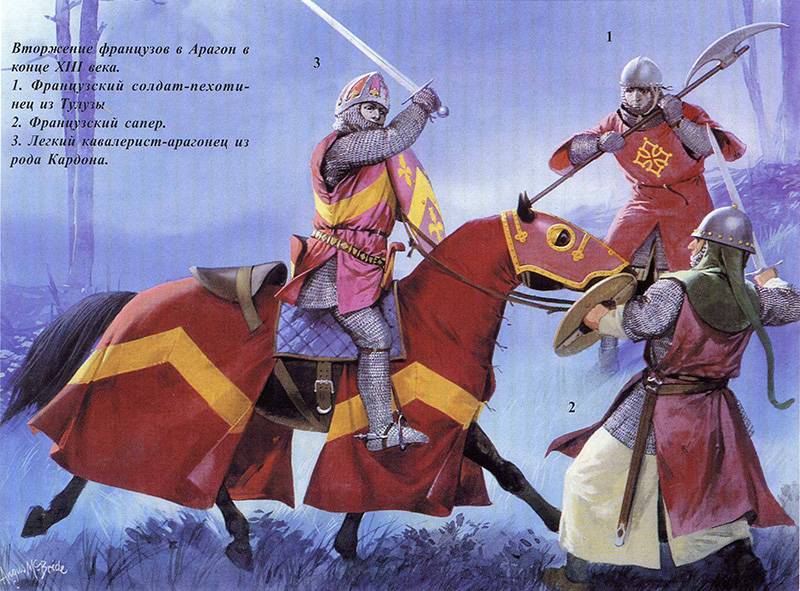
Naples raged like a cauldron in a lively tavern before dinner. News of the defeat fleet Karl Salerno and his captivity spread throughout the city with all the speed at which the rapid Italian eloquence was capable. The capital of the Sicilian kingdom was swept by riots that quickly grew into riots. But the townspeople, captured by such an exciting occupation, did not seem to suspect that the old Anjou lion was wandering very nearby and would soon return to his den. He was ready to put up with the loss of his son, but to lose the crown was beyond his ideas of humility and piety.
Sunset
Returning with his Provence fleet, Karl quickly brought order to Naples. The hundred and fifty of the most distinguished insurgents were hanged without much delay. The rest of the "wild mob" was graciously granted pardon. After extinguishing the flames, Karl decided to calm down Pope Martin IV, who, in the light of the last, far from iridescent shine of events, clearly showed signs of extreme concern. The king wrote to the pontiff an extensive letter, the purpose of which was not only to encourage the head of the church, but also to ask for something.
Of course, the capture of his son - a great misfortune, but Charles had thirteen grandchildren, so there was someone to transfer the entire farm. The monarch did not regret the colors, listing his strength and capabilities. He told Martin IV in detail about the number of own ships and the number of troops, wisely keeping silent about their quality. The state of affairs was presented with expressive vivacity: its army is mighty and fierce, the morale of the crews of the galleys is higher than their masts, and the enemy will soon be defeated.
In order for this charitable deed to be completed as victoriously as possible, at the end of the letter Karl asked the Pope of Rome fifty thousand in gold to cover his military expenses. Martin IV groaned, but ran his hand into the bins. Some of the funds were received in the form of loans from bankers in Tuscany and Florence after the corresponding papal instructions.
24 June 1284, the vast army of Charles of Anjou left Naples and slowly moved south. His fleet synchronously moved along the coast. Rumors and accommodating chroniclers inflated the number of troops to ten thousand cavalry and forty thousand infantry, although this is unlikely to be true figures. Yet it is clear that the king’s forces were very numerous and were perceived by many as almost innumerable hordes.
Despite the bravado in the letter to the pope, the true state of affairs was not so optimistic. The contingents recruited from the Italians proper were distinguished by low motivation and low fighting spirit. French soldiers had a higher skill, but their behavior in the Sicilian kingdom was more like being in the lands of enemy rather than Allied. It was expressed in systematic robbery and violence. Another part of the army consisted of mercenaries, whose desire to hold the sword in their hands directly depended on the severity of their own wallet.
Karl's ships, estimated at fifty to one hundred, were well built, with many experienced sailors among their crews. However, among the naval commanders there was not one who could be compared with the commander of the Aragonese fleet, Ruggero di Lauria. This heterogeneous army was poorly suited for a long war with a strong and experienced adversary.
At the end of July, 1285, Charles of Anjou reached Calabria and besieged the city of Reggio, held by the Aragonese garrison. Fortune, probably, did not tolerate the summer heat very well this year, because the banners of the old king were not happy with their attention. The siege of Reggio was not shaky or shaky, the landing attempt on Sicily was thwarted, and the Anjou fleet was badly battered by the storm.
Ruggiero di Lauria could not help but take advantage of the opportunity and began to devastate the coast of Calabria almost with impunity, simultaneously destroying the enemy’s sea communications. The army of Charles of Anjou continued unsuccessfully to act. The morale of the army, made up of the most diverse and significant part of not very suitable people, plummeted. Desertion began - the fugitives, especially from among the Italians, became more and more. Not even the most ferocious repressive actions helped. Aragon troops, landed from the ships in the rear of the Anjou army, more and more drained the rear system.
Realizing that a further siege of Reggio could bring trouble far greater than scattering subordinates and a richer ration, Karl ordered the siege to be lifted. In August, he began a retreat to the north - it was a clearly visible failure. The king was forced to put up with the painful loss of political capital and prestige, undermined by the troubles in Calabria.
The only encouraging glimpse of the light was from Sicily. When the threat of a direct invasion of the island somewhat decreased, the local nobility, almost yesterday almost united in their patriotic impulse, found themselves no less fascinating business: to intrigue, substitute each other and build intrigues. At the epicenter of a political storm with a Sicilian flavor was the hero of the defense of Messina Alamo da Lentino.
Together with his wife, desperately trying to compete with the wife of King Pedro III Constantia, and several other grandees and Lentino began to come to the conclusion that in Sicily not only Karl, but Aragonese too, are superfluous. They did not allow a circle of disgruntled people to transform themselves into the center of a serious conspiracy - Alamo da Lentino was summoned to the royal carpet to Barcelona, where the hero of the defense of Messina was arrested. Soon other not very nice details surfaced, especially in the financial part. The rest of his life yes Lentino spent in prison. His wife and several friends were also arrested.
However, all these steps of the Aragonese agitated public opinion in Sicily - the head of defense of Messina was quite popular. Karl was aware of the growing disappointment of King Pedro III and his team and hoped, successfully combining military successes with a new socio-economic policy towards the population, would triumphantly return to the island. The military operation with the most decisive goals and means was assigned to the spring of 1285, when the French king would begin a crusade against Aragon.
Charles Army began to winter in relatively rich Apulia. The position of the king increasingly lost its recent strength. His vast power crawled like an old canvas. Overseas territories, which include the Balkan possessions and Acre, could not give the right amount of gold and soldiers, and were in many ways subsidized regions themselves. It was still not easy to provide the army with all the necessities, and the respect of bankers became less and less sincere.
Karl chose Brindisi for his headquarters. Under his dictation, many decrees are issued, according to which everyone would begin to live in a new way, and necessarily better than before. Caring and hectic, full of sharp turns life undermined the health of Karl. His condition begins to deteriorate. In early January, 1285, he felt that the measured time was coming to an end, he made a will.
The throne was to be inherited by his son, Karl of Salerno. If the heir fails to be released from captivity, the power will pass to the eldest of the grandchildren - Karl Martell of Anjou. Earl Robert d'Artois, the old comrade-in-arms of the king, was appointed guardian of his minor grandson until his father returned from captivity or until the age of majority, if Karl of Salerno was not destined to see his homeland. The king ordered the servants and confidants to distribute large sums of gold in exchange for an oath of unconditional loyalty to their son and grandson.
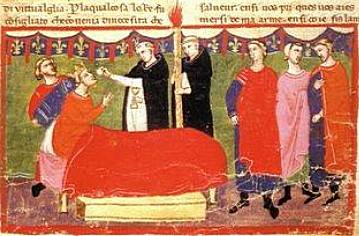
On the morning of January 7, 1285, King Charles of Anjou, the crusher of the Hohenstaufens and the failed conqueror of Constantinople, passed away. The era of the power of the Sicilian kingdom in its Angevin version was coming to an end. For more than two decades, Charles of Anjou kept the central Mediterranean in fear, turning from a provincial feudal lord into a leader of a large state. With his will, ambition, perseverance and merciless cruelty, this man made his way to the throne of the Sicilian kingdom.
He dreamed of the Mediterranean empire and, being a man of sincerely devout, considered his actions God's Providence. However, his case remained unfinished, when in the life of Charles of Anjou was put an end. To his heirs, he left the country ravaged by the war, the enemies marching on its land, and the creditors crowding in the waiting room.
The war continues
The first time after the death of Charles to many - both enemies and comrades - it seemed that the time of the Sicilian kingdom had come to an end. Calabria was occupied by the troops of Aragon, the cities in the south of Italy, one after another, went over to the side of Pedro III, and a rebellion broke out again in Naples. Even Pope Martin IV, very loyal to the Anjou house, began to hesitate in assessing the situation. Upon reflection, he refused to recognize Karl of Salerno as the heir to the throne, and called him a dubious title "son of King Charles". After some time, the pope changed his mind, recognizing Robert d'Artois as regent. At the same time, another regent was appointed — Cardinal Gerard, the Trustee.
However, the rights to the inheritance of both Karl of Salernskiy and his young son have not yet been confirmed. The regency was established under the papal throne, and not to educate young Karl Martel in the right vein, while his father languished in captivity in Sicily. Martin IV made it clear that he would decide who would occupy the throne of the kingdom. Dad, as a suzerain and patron, took sticky levers of politics in his hands.
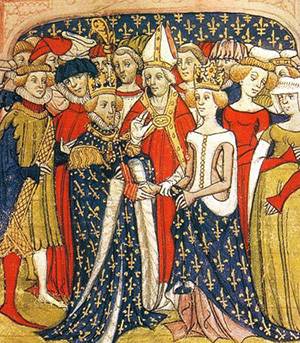
The news of the death of the terrible uncle, whom the French king Philip III not only respected, but also feared, caused a condition close to shock, not only at his nephew, but at his entire court. However, the decision of the Crusade against Aragon was not subject to cancellation. A huge army was assembled in the south of the country and was ready to speak on the first signal.
The political composition on the Iberian Peninsula was also intricate in its own way, although it fit well into medieval life. In preparing to defend the kingdom of Pedro III was the brother of Jaime II, King of the Balearic Islands and the border county of Roussillon. He was a vassal of his crowned relative. Like many younger sons, who got only a chunk of inheritance, Jaime II was not opposed to get more. In addition, often, the rulers of the outlying territories have restless thoughts in their heads. Making calculations in his mind, Jaime made it clear to King Philip that he was fully understanding the idea of the Crusade, especially the one sanctioned by the Pope.
French troops received the right of passage through the Balearic Islands and the county of Roussillon, which was immediately occupied by them. The local population, far from big politics, took the French as enemies, and rebelled. It was only with great difficulty that these disturbances were suppressed.
In the spring of 1285, Philip III's army forced the Pyrenees. Generists who were generous in numbers counted "incalculable hordes" of more than one hundred thousand people, although, of course, the real number of French troops was less solid. Nevertheless, the forces that Philip III had were much more numerous than the Aragonese army opposing them. Nobody imagined how this “charitable work” would end, no one could know that 1285 will be the last year for many participants of this drama.
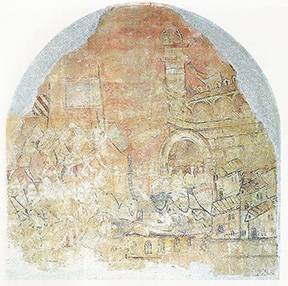
In June 1285, the crusaders laid siege to the city of Girona, the garrison and the population of which put up fierce resistance to the invaders. Pedro III quite sensibly assessed his own capabilities and diligently avoided a decisive battle. Instead, the Aragonese resorted to guerrilla tactics: their troops incessantly attacked French communications, transports and foragers, presenting a constant headache for the French command. Gerona did not give up - the dysentery epidemic that broke out in the camp besieging became an unwitting ally of the Aragonese.
By the end of the summer, which was very hot this year, almost half of the army, including the French king himself, was stricken with the disease. Finally, after a more than two-month siege, Gerona was taken. Without delaying the formalities, Philip immediately crowned his son Karl Valois as king of Sicily, but since the island was still to be conquered, this fact was only a hastily arranged presentation with a clear political bias.
However, the joy of the heavily besieged and sick winners was spoiled by very unpleasant news. Pedro III, who had at his disposal a much smaller amount of resources than his opponent, used all his capabilities. Betrayed by his brother, who had set up enemies on his land, who had not received sufficient support from his own aristocracy, closely connected with the French, the Aragonese king had at his disposal excellent commanders.
One of the best was Admiral Ruggero di Lauria. He was promptly recalled from Sicilian waters for operations against the French. And an experienced naval commander did not disappoint. The day before the fall of Gerona, 4 of September of 1285, Rugger di Lauria defeated and dispersed the French fleet, which followed passive tactics in its actions. Then, a landing party was landed in the enemy's rear near the border, which cut off Philip's main communication with his kingdom.
The position of the “crusaders”, which was already very difficult, began to deteriorate rapidly. Even without being a great strategist, the French king realized that the “crusade” idea had failed, and we should think about how to carry off the legs. Especially since the initiator of the campaign, Pope Martin IV, died on March 26 1285 of the year, having outlived Carl of Anjou.
In mid-September, Philip III ordered to take down the camp at Gerona and retreat to France. It turned out to be so difficult that I had to resort to other ways out of the critical situation, that is, to enter into negotiations with the enemy. Philip III hoped to negotiate a truce and an organized withdrawal with Pedro. However, the King of Aragon, well seeing all the numerous advantages of his position, was not inclined to broad gestures. He guaranteed free exit from Aragon only to Philip and members of the royal family. The army generosity Pedro did not apply.
Hastily collapsing the camp, the French began to retreat. Aragonese mercilessly attacked them on the heels, especially the infantry distinguished itself - the Almogavars who were well trained and knew the terrain well. A sick king, whose condition worsened, hastened to smuggle through the Pyrenees. His story was coming to an end. 5 October 1285, Philip III, died in Perpignan, the capital of an actual ally who betrayed his overlord, King Jaime II.
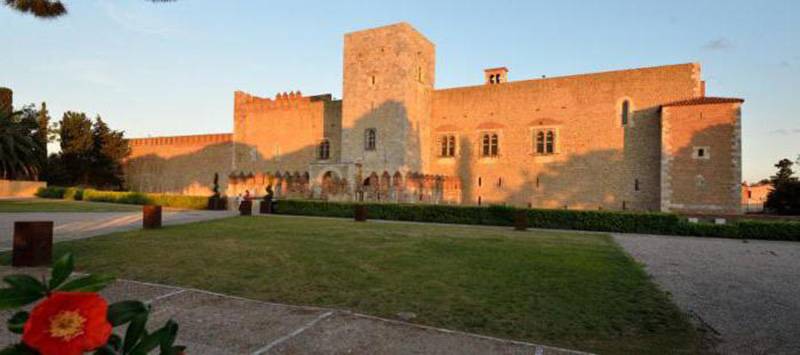
The poorly organized withdrawal of the French army soon got rid of any signs of orderliness and ended in battle in the Panissar Pass. The Aragonese overtook the grief-crusaders in a convenient place and inflicted a crushing defeat on them. The crusade against Pedro III, announced with such fervor and so long planned, ended in utter failure. Organized for reasons not of faith, but of politics, he was sent to the same Catholic country as France or the Sicilian kingdom.
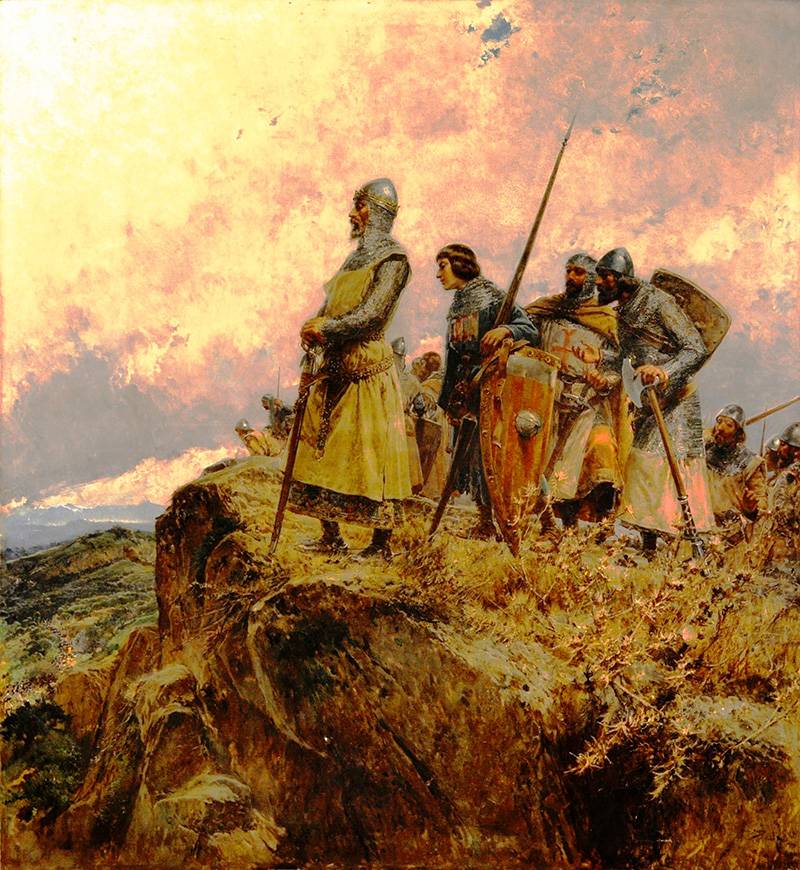
However, the winner was not destined to long enjoy the fruits of their success. 10 November 1285, Pedro III passed away. Due to the evil whim of fate, in one year almost all the main characters of the epic left the historical scene, the beginning of which was the ill-fated Sicilian vespers. One after another, the final record of the chronicles was Carl of Anjou, Pope Martin IV, Kings Philip III and Pedro III. Their mortal bodies found rest in massive sarcophagi, and their souls cooled off from their passions. And the drama continued, and now new participants appeared on the scene.
New heroes of the old story
The next father was a hardened politician Honorius IV. Unlike its predecessor, he was a Roman and believed that Italy was already too tired of war. The recipe of the world saw the pontiff in the one and indivisible Sicilian kingdom. Perseverance, growing into stubbornness in this vector of politics, will eventually lead to a number of very unfortunate events.
The throne of Aragon was occupied by the son of Pedro III of Alfonso. Sicily was given to Jaime's youngest son (not to be confused with Pedro III's multi-vector brother - Jaime II, King of Mallorca). Alfonso III went at the time of the accession to the throne 21 year, and the newly made king was a smart and courageous youth. His younger brother, who was under the influence of his mother, Queen Constance, and her closest adviser, Giovanni da Procida, also had a talent for government.
After the disastrous crusade, the son of Philip III, Philip IV, nicknamed Beautiful, became king of France. Excellent external data of the young ruler was closely combined with the talents of a statesman. His mother was the sister of Pedro of Aragon, and he, unlike his father, did not experience excessive reverence for Carl of Anjou. Before expanding ownership, in his opinion, it was necessary to restore order in the existing ones.
At the initiative of Philip IV and mediated by Honorius IV, negotiations began with Alfonso III on a truce. Convening another crusade against Aragon now did not make sense, because formally Alfonso did not claim to Sicily. Jaime was crowned in January 1286 in Palermo under the name Jaime I. After that, ambassadors were sent to the pope with a request to confirm his royal title.
Honorius IV was a skillful politician, not alien to common sense. He reconciled with many hostile factions in Central and Northern Italy, tried to carry out numerous reforms, including those aimed at improving life in the Sicilian kingdom. In one, he was completely adamant: the island of Sicily should be an integral part of the state. Therefore, when Honorius IV found out about the request of Jaime I, he replied with anathema. In addition to the Sicilian king himself, this honor was given to Queen Mother Constantia and, not for the first time, the entire population of the island.
In subsequent years, the political merry-go-round began to turn, the goal of which was to achieve what was desired with the least losses. Everyone remembered Carla Salerno, who was languishing in the Catalan dungeons, who had not lost hope of finding freedom. A complex and famously twisted political game was played around this figure, the participants of which were the Pope, the Sicilian, the Aragonese and the French courts.
Carl was ready to exchange Sicily for freedom, but the father forbade the giving of the island. The prisoner, not without regret, but readily refused the right to collect tribute from the Tunisian emirate, but the French, who were afraid of gaining Aragon and who were afraid that “the money would go wrong,” also obstructed such an agreement. In the end, Karl Salensky spat on the circumstances signed an agreement with Jaime, according to which he refused Sicily, Malta and some other territories and the right to collect tribute from the emir of Tunisia. In exchange, he received his freedom and pledged to get the pope to abolish the anathema against Aragon and Jaime I. The last to secure the contract was to marry the daughter of Charles.
Everything was fine on the parchment with the royal seals, but Honorius IV reacted to the attempt to resolve the conflict by peaceful means by another invasion of Sicily. In the spring of 1287, a large Anjou army landed on the island and laid siege to the city of Augusta. By the end of June, supplies of the besiegers began to come to an end, and the city held on. To speed up the siege in Naples, a fleet was formed, at the head of which the Count of Flanders was assigned. He had to completely block Augusta from the sea.
However, the papal plans once again threw overboard Admiral Rugger di Lauria. Arriving in the Gulf of Naples, 23 June 1287, he cunningly lured the enemy into the sea. On his orders, the sailors showered the Anjou with caustic sneers, insults and well-aimed archery shots. The patience of the Count of Flanders and his subordinates, among whom were many noble knights, too susceptible to Mediterranean eloquence, quickly exhausted. Anjou fleet of more than fifty galleys went to sea, where he was awaited by a complete rout.
Competently maneuvering, the Aragonese immediately attacked the chosen enemy ship with several ships and easily captured it. Thus, by the end of the battle, which lasted a whole day, the Anjou fleet was eliminated. More than 40 ships were captured, the loss in manpower reached almost 5 thousand people killed and captured. This naval battle went down in history as the “battle of the counts” because of the abundance of the participating, lost and captive nobles, including the Count of Flanders himself.
Ruggiero di Lauria was not inclined to bloodthirstiness and released his high-ranking prisoners for a huge ransom, which allowed him to pay off the salaries owed to his sailors. Left without support from the sea, the Anjou army abandoned the siege of Augusta and was evacuated to the mainland. Another attempt to regain control of Sicily failed.
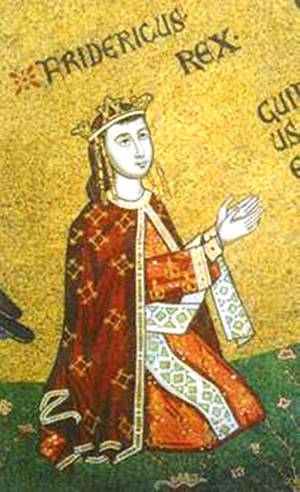
The Sicilian Vespers War lasted another five years, stepping from the XIII century to the next, XIV century. Intrigues, broken negotiations and treaties were replaced by battles, and those by regular agreements. The deck of participants in this conflict, which stretched in time, was again shuffled several times, some cards dropped out of it and others were added.
After many events of 31 in August of 1302, with the active participation of the then Pope Boniface VIII, the Caltabello Peace Treaty was finally concluded, according to which Sicily remained with Jaime's brother Federigo. He had to marry the daughter of Karl of Salerno, so that after the death of Federigo, power over the island would again pass to the Anjou dynasty.
The war, which was distinguished by the heat of hostilities and political passions, finally ended. The story with a sigh of relief put an end to it, which, on closer examination, looked more like a comma.
Information